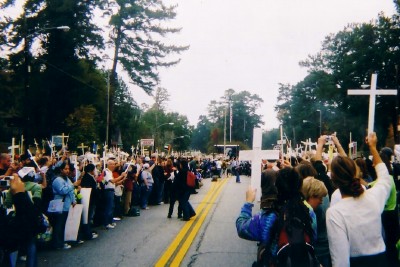 |
| Photo by Patrick Mulvaney of 2004 SOA Protest Funeral Procession Read his recount here |
Yet, outside of a handful of Catholic and Protestant churches, will this protest get any attention this Sunday in our churches? How many churches will remember the victims of our military actions in their prayers of the people? Will there be any special services to commemorate this ongoing suffering tragedy?
I want to contrast this with what I saw earlier this month all over social media, in the news and with my own eyes. On the Sunday before Veterans Day, there were special services, invitations to military families, and prayers for our troops. Here is just one of many examples: Rick Warren's Saddleback Church had a special invitation to military families.
If you're a veteran or currently serving, we'll honor you today at all USA campuses.Invite veterans! pic.twitter.com/XqPuzwVVoB
— Rick Warren (@RickWarren) November 10, 2013
When will Saddleback Church
make a special invitation to peacemakers and their families? Or any
church for that matter?When will churches give prayers for the victims of war in the Prayers of the People? When will we remember the deaths of our fellow Christians or even humans affected by our extremely large military? Even more, when will we recognize that we are all complicit with the military industrial complex that feed off a patriotic Christianity in the United States? This is one of our sins that we need to recognize!
I have seen pastors who are worried about saying anything to disrupt their congregants on Veterans Day weekend. If they didn't want to glorify war, most of them stay silent and did not mention their real beliefs. Veterans Day weekend in the Church should have been one of mourning. Yes, mourning that the War to End All Wars did not do accomplish that. Instead it continued a brutal and violent history. We should mourn how we so eagerly send off young people to fight to keep the Defense Industry wealthy, while we ignore veterans on the streets?
Sadly American Christianity is currently more interested in upholding American Exceptionalism rather than having a prophetic voice. When will we recognize that God does not just love us but the whole world? Until that point, American Christianity will continue to worship America more than God.


